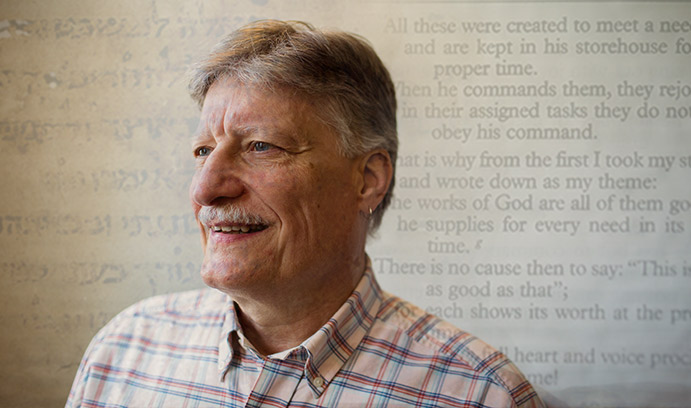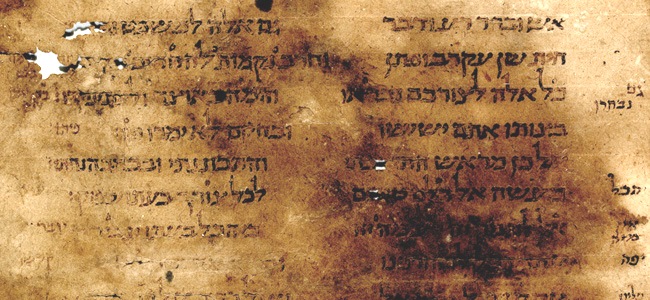The Enduring Lessons of Antiquity

Ben Wright, University Distinguished Professor of Religion Studies, has translated and written extensively on The Book of Ben Sira, a collection of teachings written more than 2,000 years ago by a Jew in Jerusalem. (Photo by Christa Neu with Kate Cassidy)
Benjamin G. Wright is University Distinguished Professor and professor of the history of Christianity in the department of religion studies. A specialist in the origins of Christianity and the history of Judaism, Wright spends much of his time studying ancient religious texts and writing and lecturing about them. He has also been a pioneer in the use of computer programs as a research tool in his field.
Wright has written or edited eight books and numerous articles and book chapters. His books include The Letter of Aristeas: ‘Aristeas to Philocrates’ or ‘On the Translation of the Law of the Jews’ (2015), Praise Israel for Wisdom and Instruction: Essays on Ben Sira and Wisdom, The Letter of Aristeas and the Septuagint (2008) and A New English Translation of the Septuagint (2007).
An active hockey fan and USA Hockey instructor, Wright has served as coach and faculty advisor to Lehigh’s ACHA Division 1 Club team. He recently sat down with Kurt Pfitzer to talk about his research and teaching.
Why should students in the 21st century study the ancient world?
Students constantly receive the message both from the larger society and, yes, even from Lehigh that there isn’t much to be learned from the study of antiquity. But by looking at how ancient peoples lived, we may get some insights into modern people and what their options are.
For example, most people think globalization is a modern phenomenon. But it’s not. In the first century, Jews lived all over the ancient Mediterranean world. How did they get there? Some of them got there as captives of war, some as refugees, some because they were doing business.
How did Jews shape and construct identities in these various places they had to call home? How do you make a home when you’re a war refugee? If that doesn’t have any contemporary relevance, I don’t know what does. What does it mean to be Syrian trying to get to Greece and maybe the United States so your children don’t die? Ancient Jews had to deal with questions like these.
The study of religions and their histories requires knowledge of ancient languages. Which languages are you conversant in?
For my Ph.D., I had to have Hebrew, Greek, Latin and Syriac at a minimum. Syriac is an Aramaic-related language. I also have to read German and French because a lot of articles in my field are written in those languages. Biblical studies is really an international field; English has started more and more to dominate, but the expectation has always been that you read in German, French and English—and more recently in Modern Hebrew, Italian and Spanish as well.
I’ve also studied Coptic and Armenian but my Armenian is not so good these days. I should probably resurrect it because there are two Armenian translations of Ben Sira.
How does a knowledge of ancient languages benefit a religion scholar?
One issue in studying ancient Judaism is that many non-biblical Jewish texts survive only in translations, often tertiary translations that were preserved in Christian transmission. Take the Book of First Enoch, for example. It was written in Aramaic and then translated into Greek and then from Greek into Ethiopic. But the only full version that we have is in Ethiopic.
First Enoch is a work made up of 5 separate little tractates, and it’s incredibly important for the history of Judaism and the period of history that I work in. It survived into modernity only in Ethiopic until the Dead Sea Scrolls were found. Fragments of various pieces of it have been recovered in Aramaic and Greek.
Other early Christian churches, such as that in Armenia, preserved ancient Jewish texts, so many Christian and Jewish apocryphal books that have survived are in Armenian or Old Church Slavonic, for example.
What do your students gain by studying the Bible and other ancient texts?
Ancient texts have implications for how we think of the development of religious traditions, especially Judaism and Christianity, the two most prominent religions in the U.S. I try to give students a sense of the importance of understanding and reading these texts for what they actually say, not necessarily for what students have been taught that they say. Your typical Christmas nativity set has wise men and shepherds, for example, but look at the text [of the New Testament]. The shepherds and the wise men are in different gospels [Luke and Matthew], and they never meet each other.
In my course on the New Testament, I try to [show how] these texts change when we read them individually for their own agendas and what that might mean for the way in which we think about various issues connected with Christianity and its development. And if you’re thinking about Christianity and its development in antiquity, by implication it’s going to have something to say about today.
A careful and close reading of ancient texts leads to a greater understanding of how texts get used and interpreted. To me, that’s incredibly relevant in the world of political rhetoric today. In my courses, students gain an appreciation of how every text that matters is interpreted in multiple ways. They can then evaluate and critique competing interpretations.
You originally chose a different direction…
I went to college to be a vet; I had worked six years for a vet, from seventh grade through high school. I started out as a biology major in college.
What led you to the study of ancient texts and religious history?
I tell my students that they’ll look back on their lives at some point and there will be a moment where they made a decision that they didn’t think about for more than five seconds. They’ll look back on their lives and say, “Holy mackerel! That decision I never thought about helped determine the rest of my life.”
I was not happy in the biology program as a freshman. One day, I was sitting with a friend of mine in a physics help session. He said to me, “I’m changing my major.” I said, “To what?” He said, “To philosophy and religion.” I went to the registrar’s office with him the next day just to go with him. I have no idea what possessed me, it was probably a demon, and I changed my major too. My friend has been a Lutheran pastor for the last 30 years. I went to graduate school and got a Ph.D.
I was always interested in religion; I grew up in a fairly religious household, and I grew up reading the Bible. I was always fascinated by the biblical texts. I thought, “If I could spend the rest of my life studying this stuff and get paid to do it, how good would that be?”
The Book of Ben Sira (called Ecclesiasticus or Wisdom of Ben Sira in the Catholic Bible and the Wisdom of Sirach by Eastern Orthodox Christians) is a collection of teachings written more than 2,000 years ago by a Jerusalemite Jew and translated in Egypt. You have translated Ben Sira, and you’ve spent three decades studying it. What is its importance?
Ben Sira was written in Hebrew and translated into Greek by someone claiming to be the author’s grandson. In the 1980s, there was a burgeoning interest in how Greek translators translated Hebrew, what techniques they used. In the prologue to Ben Sira, the translator says, “You were invited to a reading with good will and attention and to exercise forbearance in cases where we might be thought to be insipid in regard to some expressions that had been the object of great care and rendering…for what was originally expressed in Hebrew does not in fact have the same force when rendered into another language.”
The translator actually says that what is said in Hebrew doesn’t have the same rhetorical force when it is expressed in Greek. This is one of the only examples in ancient Judaism of someone who actually talks about translating and then does it.
What are some of the challenges in studying Ben Sira?
Ben Sira is a complicated book. It was written in Hebrew and translated into Greek. A Latin version was translated from Greek and a Syriac version was translated from the original Hebrew, which makes the Syriac really important. So if you’re going to work on Ben Sira, you really have to know those four languages at least.
Your Letter of Aristeas is part of a series titled Commentaries on Early Jewish Literature. The original Letter of Aristeas was written by a Jew living in Alexandria, Egypt, to his brother Philocrates. What was the genesis of your interest in Aristeas?
This series was begun a long time ago. The editor, Loren Stuckenbruck, emailed me and said, “We want you to be involved in the project. Here is a list of the books that haven’t been assigned yet; pick whichever one you want.” The original Letter of Aristeas relates the earliest legend of the translation of the Septuagint [the first five books of the Old Testament]. I was doing a translation project in the area of Septuagint studies so I picked this book. 458 pages later, here it is.
How did this translation come about, according to legend?
The story goes that Demetrios, the head librarian of the Library of Alexandria, is told by Ptolemy II [Philadelphus, king of Egypt from 283 to 246 BCE] to get all the books in the world. Demetrios says, “We don’t have the law of the Jews because it’s written in this weird alphabet, in this strange language which is like Syrian. It needs to be translated.” So in Star Trek fashion, Ptolemy says, “Let it be done.” He sends to Jerusalem for 72 translators to translate the Hebrew Torah into Greek. The 72 translators go to Alexandria, do the translation, and Ptolemy sends them home with lots of gifts.
I don’t think it’s historical at all; I think it’s complete fiction. But the original Letter of Aristeas is one of the main sources that we have about the Library of Alexandria. It’s an important source for knowing at least a little bit about the library.
Are there scholars who believe that the account by Aristeas is historical?
Some scholars argue that some of the core bits are historical or at least could be. The Letter of Aristeas has become prevalent as a way of trying to understand the origins of the translation of the Torah into Greek. But we really don’t know the origin of the translation.
You were one of the first scholars in your field to use computer technology. How have computers influenced your research?
My Ph.D. dissertation was one of the first in my field to use computer technology extensively. That was in the 1980s, the dinosaur age of computers. It can be depressing looking back. What took days and days and days back in the ’80s, I can do in a few seconds now.
Before computers, people would take a chapter or two of a book, look really carefully at every word in the Hebrew and the Greek and then generalize [their analysis] to the entire book. The use of the computer enabled me to get at large chunks of data. I learned to do some very basic coding. Back then, I could write a 100-line program that would pull out the material I needed and put it into a file so I could print it out. This took hours and hours of work. Now, with sophisticated biblical studies programs, you can do it in no time.
If you have only a Greek translation of an original Hebrew text that is no longer extant, how accurately can that help you reconstruct the original?
If it’s a literal translation that follows the [original] word order, and if word A in Greek is always word A in Hebrew, then you have more confidence in making a reconstruction. But if not, then you have less confidence.
How would you know if it’s word for word?
For The Book of Ben Sira, 70 percent of the book survives in some form of Hebrew. Can I reconstruct the other 30 percent? The question I have to ask is, how consistent is the translator? If the translator is really consistent, then I might be able to recreate what that other 30 percent looked like. If he’s not consistent in various aspects of the text, then I can’t.
With word order, Ben Sira is high on the scale with only 3 percent word-order differences. So in many cases, we can reconstruct word order. On the other hand, if you look at nouns and verbs, you might have three or four different Greek translations for the same Hebrew word, or you might have three or four Hebrew words for the same Greek word. So reconstructing nouns and verbs is a much more dicey prospect. I was able to look at large amounts of data by using computers to pull out various aspects of translation that I wanted to analyze.
You travel frequently to give lectures and lead seminars. Can you give us an idea of your travel schedule?
I spent last spring semester (2016) in The Netherlands on a research fellowship at the University of Groningen. I led a seminar on Judaism in the Hellenistic world and did work on Ben Sira. In September, I was in Cambridge, England, and in November, I went to San Antonio.
I went to Hong Kong over Spring Break. I gave a series of lectures there. One was called “Why Study Ancient Judaism” and another was on The Book of Ben Sira and its manuscript tradition. I had a conference in Munich in May on tempting and temptation in ancient Judaism and a conference in Italy in June. In November I’ll be in Boston for the Society of Biblical Literature in the American Academy of Religion. Next spring (2018) I’ll spend eight weeks in Oxford doing a research seminar on the Greek vocabulary of the Septuagint.
What do you think your legacy will be?
With all the writing I’ve done on Ben Sira, you’d think that might be my lasting contribution, but it might actually be The Letter of Aristeas. My commentary was the first real full-length one on Aristeas. I don’t think it will be done again soon, but if somebody does take it on, I hope they improve on mine.
In the meantime, I’ve got two more books I want to write, so we’ll see.
Posted on:






